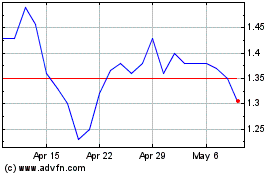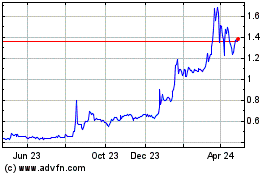Freddie Mac Profit Declines on Rates
August 02 2016 - 9:50AM
Dow Jones News
Mortgage-finance company Freddie Mac said its quarterly profit
declined, hurt by lower interest rates and losses from derivatives,
and it will send a $933 million dividend payment to the
Treasury.
Freddie reported a second-quarter profit of $993 million,
compared with a prior-year profit of $4.17 billion and a
first-quarter loss of $354 million.
The latest quarter included a $400 million hit tied to a decline
in interest rates and a $100 million gain from credit spreads.
Losses from derivatives, which Freddie uses to hedge interest-rate
risk, were $2.06 billion in the quarter, compared with a gain of
$3.14 billion in the same quarter last year.
Amid improvement in the housing market, Freddie saw its serious
delinquency rate continue to improve, reaching 1.08%, the lowest
level since 2008.
Freddie and mortgage-finance firm Fannie Mae were put into a
so-called conservatorship under government control during the 2008
financial crisis.
Under the terms of the bailout, the companies must send nearly
all of their profits to the government in the form of dividends and
wind down their capital buffers over time.
Because its net worth of $2.1 billion was more than its capital
buffer of $1.2 billion, Freddie will send a $933 million dividend
to the Treasury for the quarter. It also didn't need a capital
infusion because total equity remained positive, though it declined
to $2.13 billion from $5.71 billion a year earlier.
In all, after the quarter's dividend, the company will have sent
$99.1 billion to the Treasury, compared with the $71.3 billion
infusion it will have received.
Freddie and Fannie have recently been caught between
shareholders, civil-rights groups and some small lenders who want
to see them freed from government control, a White House that
believes the current system is broken, and a Congress that can't
come to agreement on what the future system should be.
The price of Freddie's portfolio, as with that of all bonds,
rises and falls as interest rates change. The company uses
derivatives in an effort to counteract that effect, but because of
accounting rules, the derivatives can make large profits or losses
appear over short periods.
Over the long term, the impact of the derivatives accounting
issue is negligible. But as the capital buffer disappears, the
accounting issue could cause Freddie to require an injection of
capital from the Treasury.
Fannie and Freddie don't make loans. Instead they buy them from
lenders, wrap them into securities and provide guarantees to make
investors whole if the loans default.
Write to Austen Hufford at austen.hufford@wsj.com
(END) Dow Jones Newswires
August 02, 2016 09:35 ET (13:35 GMT)
Copyright (c) 2016 Dow Jones & Company, Inc.
Federal Home Loan Mortgage (QB) (USOTC:FMCC)
Historical Stock Chart
From Mar 2024 to Apr 2024

Federal Home Loan Mortgage (QB) (USOTC:FMCC)
Historical Stock Chart
From Apr 2023 to Apr 2024
